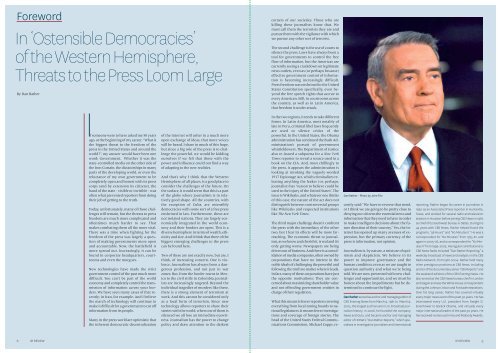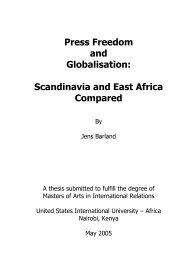FOCUS ON THE AMERICAS - International Press Institute
FOCUS ON THE AMERICAS - International Press Institute
FOCUS ON THE AMERICAS - International Press Institute
You also want an ePaper? Increase the reach of your titles
YUMPU automatically turns print PDFs into web optimized ePapers that Google loves.
Foreword<br />
In ‘Ostensible Democracies’<br />
of the Western Hemisphere,<br />
Threats to the <strong>Press</strong> Loom Large<br />
By Dan Rather<br />
If someone were to have asked me 50 years<br />
ago, at the beginning of my career, “What is<br />
the biggest threat to the freedom of the<br />
press in the United States and around the<br />
world?”, my answer would have been one<br />
word: Government. Whether it was the<br />
state-controlled media on the other side of<br />
the Iron Curtain, the dictatorships in many<br />
parts of the developing world, or even the<br />
reluctance of my own government to be<br />
completely open and honest with its press<br />
corps (and by extension its citizens), the<br />
hand of the state - visible or invisible - was<br />
often what prevented reporters from doing<br />
their job of getting to the truth.<br />
Today, unfortunately, many of those challenges<br />
still remain, but the threats to press<br />
freedom are much more complicated and<br />
oftentimes much harder to see. That<br />
makes combating them all the more vital.<br />
There was a time when fighting for the<br />
freedom of the press was largely a question<br />
of making governments more open<br />
and accountable. Now, the battlefield is<br />
more spread out. Increasingly, it can be<br />
found in corporate headquarters, courtrooms<br />
and even the morgues.<br />
New technologies have made the strict<br />
government control of the past much more<br />
difficult. You can’t be part of the world<br />
economy and completely control the transmission<br />
of information across your borders.<br />
We have seen many cases of that recently;<br />
in Iran, for example. And I believe<br />
the march of technology will continue to<br />
make it difficult for a government to cut off<br />
information from its people.<br />
Many in the press world are optimistic that<br />
the inherent democratic decentralization<br />
of the Internet will usher in a much more<br />
open exchange of ideas, that more voices<br />
will be heard. I share in much of this hope,<br />
but since a big role of the press is to challenge<br />
the powerful, we would be kidding<br />
ourselves if we felt that those with the<br />
power and influence could not find a way<br />
of adapting to the new realities.<br />
And that’s why I think that the Western<br />
Hemisphere, of all places, is a good place to<br />
consider the challenges of the future. On<br />
the surface, it would seem that this is a part<br />
of the globe where journalism is in relatively<br />
good shape. All the countries, with<br />
the exception of Cuba, are ostensibly<br />
democracies with some sort of a free press<br />
enshrined in law. Furthermore, these are<br />
not isolated nations. They are largely economically<br />
integrated in the world economy<br />
and their borders are open. This is a<br />
diverse hemisphere in terms of wealth, ethnicity<br />
and size. And I think that three of the<br />
biggest emerging challenges to the press<br />
can be found here.<br />
Two of these are not exactly new, but are, I<br />
think, of increasing concern. One is violence.<br />
Journalism has always been a dangerous<br />
profession, and not just in war<br />
zones. But, from the border towns in Mexico<br />
to the civil strife in Colombia, journalists<br />
are increasingly targeted. Beyond the<br />
individual tragedies of murders like these,<br />
there is a strong element of terrorism at<br />
work. And this cannot be considered only<br />
as a local form of terrorism. Since new<br />
technology allows reporters to share their<br />
stories with the world, when one of them is<br />
silenced we all lose an immediate eyewitness.<br />
Journalism has the power to change<br />
policy and draw attention to the darkest<br />
corners of our societies. Those who are<br />
killing these journalists know that. We<br />
must call them the terrorists they are and<br />
pursue them with the vigilance with which<br />
we pursue any other sort of terrorist.<br />
The second challenge is the use of courts to<br />
silence the press. Laws have always been a<br />
tool for governments to control the free<br />
flow of information, but the Americas are<br />
currently seeing a crackdown on legitimate<br />
news outlets, even as (or perhaps because)<br />
effective government control of information<br />
is becoming increasingly difficult.<br />
<strong>Press</strong> freedom was enshrined in the United<br />
States Constitution specifically, even beyond<br />
the free speech rights that accrue to<br />
every American. Still, in courtrooms across<br />
the country, as well as in Latin America,<br />
that freedom is under attack.<br />
In the two regions, it tends to take different<br />
forms. In Latin America, most notably of<br />
late in Peru, criminal libel laws frequently<br />
are used to silence critics of the<br />
powerful. In the United States, the Obama<br />
administration has continued the Bush Administration’s<br />
pursuit of government<br />
whistleblowers. The Department of Justice<br />
also re-issued a subpoena for a New York<br />
Times reporter to reveal a source used in a<br />
book on the CIA. And, most chillingly to<br />
the press, it appears the administration is<br />
looking at invoking the vaguely-worded<br />
1917 Espionage Act, which criminalizes releasing<br />
anything the leaker (or, perhaps,<br />
journalist) has “reason to believe could be<br />
used to the injury of the United States”. The<br />
issue is Wikileaks, and whatever one thinks<br />
of this case, the nature of the act does not<br />
distinguish between controversial groups<br />
like Wikileaks and respected institutions<br />
like The New York Times.<br />
The third major challenge doesn’t confront<br />
the press with the immediacy of the other<br />
two, but I fear its effects will be more farreaching.<br />
The economic threat to journalism,<br />
as we know and cherish it, is real and it’s<br />
only getting worse. Newspapers are being<br />
driven out of business. And there is a consolidation<br />
of media companies, often owned by<br />
corporations that have no interest in the<br />
noble ideals of challenging the powerful and<br />
following the truth no matter where it leads.<br />
In fact, many of these corporations have just<br />
the opposite motivations: They are concerned<br />
about maximizing shareholder value<br />
and not offending government entities in<br />
charge of their regulation.<br />
What this means is fewer reporters covering<br />
everything from local zoning boards to national<br />
legislatures. It means fewer investigations<br />
and coverage of foreign stories. The<br />
head of the United States Federal Communications<br />
Commission, Michael Copps, re-<br />
Dan Rather - Photo by John Filo<br />
cently said: “We have to reverse that trend,<br />
or I think we are going to be pretty close to<br />
denying our citizens the essential news and<br />
information that they need to have in order<br />
to make intelligent decisions about the future<br />
direction of their country.” Yes, the Internet<br />
has opened up many avenues of expression,<br />
but the primary currency of the<br />
press is information, not opinion.<br />
Journalism is, by nature, a mixture of optimism<br />
and skepticism. We believe in its<br />
power to improve governance and the<br />
human condition, even as we are taught to<br />
question authority and what we’re being<br />
told. We are now presented with new challenges<br />
and opportunities, and we must be<br />
honest about the impediments but be determined<br />
to continue the fight.<br />
Dan Rather served as anchor and managing editor of<br />
CBS Evening News from March 9, 1981 to March 9,<br />
2005, the longest such tenure in U.S. broadcast journalism<br />
history. In 2006, he founded the company,<br />
News and Guts, and became anchor and managing<br />
editor of HDNet’s “Dan Rather Reports,” which specializes<br />
in investigative journalism and international<br />
reporting. Rather began his career in journalism in<br />
1950 as an Associated <strong>Press</strong> reporter in Huntsville,<br />
Texas, and worked for several radio and television<br />
stations in Houston before joining CBS News in 1962<br />
as chief of its Southwest bureau in Dallas. During his<br />
44 years with CBS News, Rather helped found the<br />
programs, “48 Hours” and “60 Minutes II.” He was a<br />
correspondent for “60 Minutes” from 1975-81, and<br />
again in 2005-06, and a correspondent for “60 Minutes<br />
II” from 1999-2005. His regular contributions to<br />
CBS News Radio included “Dan Rather Reporting,” a<br />
weekday broadcast of news and analysis on the CBS<br />
Radio Network, from 1981-2004. Rather held many<br />
other prestigious positions at CBS News, including<br />
anchor of the documentary series “CBS Reports” and<br />
the weekend editions of the CBS Evening News. He<br />
also served as the CBS News bureau chief in London<br />
and Saigon and was the White House correspondent<br />
during the Johnson, Nixon and Ford administrations.<br />
Over his long career, Rather has covered virtually<br />
every major news event of the past 50 years. He has<br />
interviewed every U.S. president from Dwight D.<br />
Eisenhower to Barack Obama, and virtually every<br />
major international leader of the past 30 years. He<br />
has received numerous Emmy and Peabody Awards.<br />
8 IPI REVIEW<br />
IPI REVIEW 9

















